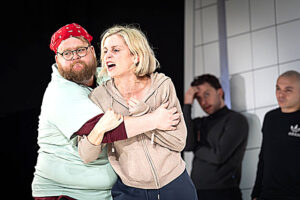
Denise Gough told David Hennessy about returning to her Olivier Award- winning role of addict Emma in People, Places and Things on the West End.
Denise Gough won the Olivier Award for playing Emma in People, Places and Things in 2016 and has now reprised her star making role in another unmissable production on the West End with a supporting cast that includes Sinead Cusack.
In our recent review, The Irish World said it was one of the best pieces of theatre we have seen and that Gough should be making room for more awards.
Directed by Jeremy Herrin, the play by Duncan MacMillan tells the story of Emma, an actress who finds herself checking into a rehab centre for drugs and alcohol.
Tired of waking up with people she doesn’t know with bruises she can’t account for, Emma has to make some changes to her chaotic lifestyle.
Gough has become a familiar face on television screens since her star turn in People, Places and Things with starring roles in Paula on BBC, playing the ‘yummy mummy killer’ in Too Close opposite Emily Watson in ITV’s Too Close and also starring in Netflix hit Who is Erin Carter?
She has also made it into the Star Wars universe with her role in the prequel Andor.
But if she could, she would only work onstage.
While some of what Emma says about acting resonates with her, it is not Denise’s addiction but rather her church and gives her something that religion does not.
“It’s tiring but I’m really happy to be doing it again,” Denise told The Irish World.
“We always knew that we wanted to, it was just when.
“Doing a job that has meaning is the ultimate goal.
“I’m an artist.
“I want to reflect things to people.
“I also want the things that I believe I deserve, financial security and everything so I have focused on doing that too.
“But when it comes to working on stage, I want things that have meaning and this play has such meaning.
“And they’re rare so when they come around, you want to kind of do it until you don’t want to do it anymore.
“I thought it was the most truthful depiction of addiction that I had ever read.
“I thought that it was really brave and bold.
“I assumed that Duncan must be in recovery or something but he just is very, very talented and rigorous in his research.
“I thought it was a brilliant play and I thought it was a great part.
“That’s what I felt when I read it.”
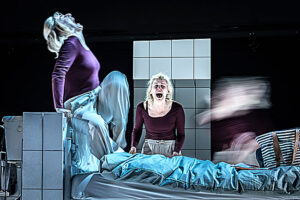
People, Places and Things may have taken Denise’s star up and saw her lauded with awards and accolades but this was never what it was about for her.
“It was never, ever, ever, ever, ever about that. Ever.
“It was never. That’s not why I did it. That’s not why I wanted to do it.
“I did it because I was given the part but it was never about what it could do for my career.
“I only thought that the play would happen at the National Theatre and that I would do it once.
“Everything else came as a byproduct of doing work with meaning and integrity.
“Nothing I ever really do on stage is about a career move ever.
“TV is different.
“I’ve done certain things to buy my house but stage is an art space. It’s a church.
“I don’t go in there to promote or elevate my career.
“I do it because it’s important.”
We said in our review that it is tribute to Gough’s acting that the audience connect with Emma despite never really knowing if anything she says of herself is true.
But Gough herself is unconcerned with whether the character comes across as ‘sympathetic’..
“I don’t care whether you find her sympathetic or not, that’s not the point.
“The point is to tell a truthful story and whatever you think about it is your reaction.
“I don’t get involved in making people sympathetic or not sympathetic, my job is to tell the truth.
“And I think when you tell the truth, even the most uncomfortable things can be met with maybe a level of compassion that you didn’t think you had.
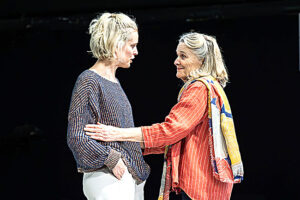
“I’m not there to be liked. I don’t care about whether she’s liked or not.
“Those questions, those sorts of conversations happen a lot when it’s a woman: To make her sympathetic which is essentially likeable.
“Because it’s kind of shocking, or it’s not as shocking now, because Phoebe (Waller Bridge) did Fleabag and Billie Piper did Yerma and there’s all sorts of women doing unlikable characters, but I don’t think anyone would ask Mark Rylance, ‘Is it part of your process to make him sympathetic?’
“It’s just not a conversation.
“So the more I hear that, because I hear it a lot, the more I speak on it because I think it’s really important because that’s the insidious thing that’s still happening.
“It’s not about sympathy, it’s about understanding and you will meet this character at the level with which you’re able to understand or not understand, or feel for or not feel for her, but it’s none of my business.”
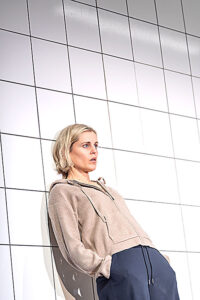
When we meet Emma’s parents, we see some of the reasons why Emma drank..
“Not everybody feels that, a lot of people had an opposite response where they think, ‘No wonder her parents feel that way’.
“This is what great art does.
“It’s personalised to you so for you, it’s really interesting that you watched it and thought, ‘Oh no wonder she went and got drunk’.
“Whereas another person that interviewed me said, ‘God, I really understood why their parents spoke to her like that at the end’.
“That’s the point so it’s up to you guys as audience members to talk to each other also about what responses you have.
“I’ve witnessed stand up arguments between people about that final scene, and that’s the point.
“Because we’re all meeting the world based on the tools that we’ve been given and the understanding that we have and the knowledge that we have.
“In the middle of the play, I make a speech saying her mother’s father died when she was five and her mother when she was 11. She was moved around a lot possibly in foster homes.
“So where does your compassion level end? Trauma is inherited. Unless you do the work now, you’re just going to hand it on.
“The mother has just handed on.
“We had a family therapist come this time and we went a lot deeper because the language around addiction is so much deeper, and this family therapist said that it’s a play about the mother.
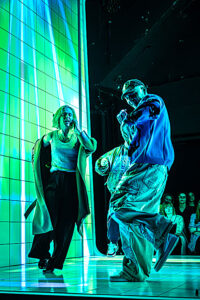
“We were really shocked.
“She said, ‘Yeah, it’s the mother’s trauma manifested in her daughter’.
“That all the things she hadn’t worked out for herself she handed on, and then her daughter is reflecting back to her.
“It’s hard to hear and I’m sure it’s very hard to hear if you’re a parent too.
“They fu** you up, your mum and dad, but their mums and dads f**ked them up too.
“It’s that Philip Larkin poem.
“So your response to that final scene is your response, but other people have responses that are much more on the side of the parents.
“It’s really interesting and that’s why it’s a great play.
“And that’s why I think it’s a modern masterpiece of a play.”
I think it comes as such a shock as Emma’s mother is played by Sinead Cusack who we’ve already seen playing the doctor and therapist Lydia who are both more forgiving than her mother who is cold to say the least…
“But I think what we’re really seeing this time around is how extraordinary this play is because that’s the point.
“He (Duncan MacMillan)’s so smart.
“He could have had three different people play those parts but by linking them all together, he’s tapping into the audience’s need for the mother figure to be kind and benevolent because even the doctor, she’s not as soft as Lydia but she’s still very robustly loving.
“So when the mother comes in we think, ‘Ah, it’s gonna be like it was in the therapy session. She’s gonna be nice to her’.
“He’s a brilliant writer, a brilliant writer and Sinead is a brilliant actress.
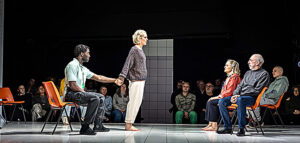
“The shock for Emma is that her father is the one who interrupts, she just thinks he’ll be fine. He’ll sort of say nothing and he won’t want to talk about it.
“The shock in that scene for Emma, initially, is that it’s her dad that speaks to her like that.
“But also they’ve heard it before. He’s right. They have heard it before. They’ve been through this before.
“She didn’t even show up to (her brother) Mark’s funeral. Like these are hurt, hurt parents who have been through so much of this with this woman before and now here she is approaching 40.
“They’re all flawed, all of them. It’s nobody’s fault.
“I think the lack of understanding around addiction is why these things happen. It’s a brilliant play.”
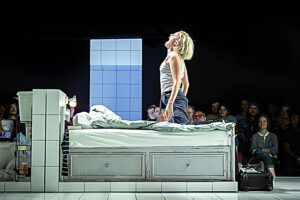
Denise’s parents have been hurt too. They have also lost Mark, Denise’s brother.
But as Emma’s story changes several times, it is hard to know what actually happened to Mark..
“She lies in ways to protect herself.
“She doesn’t want people to get to know her but there are truths in there.
“It’s just as an audience you don’t know what the truths are.
“Other people don’t have to lie.
“Emma’s trying to survive.
“People aren’t addicts because they want to be, people find solutions to their pain.
“It’s not ‘Why the addiction?’ It’s, ‘Why the pain?’
“And I don’t think the core of it is Mark’s death at all. I think it goes way back previous to that.
“It’s her mother’s trauma so it goes back generations, that’s the thing.
“You’ve gone, ‘Oh, it’s because her brother died’.
“Yes, that’s part of it but we spoke to a lot of therapists and doctors and psychiatrists and psychologists and actually, those things that really form us happen between the ages of zero and four.
“And also trauma is not what happens to you, it’s what happens inside of you as a result of what happens to you.
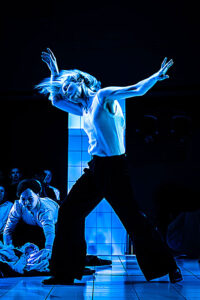
“So for some people losing their brother- Yes, it’s sad, and it’s a traumatic event but it doesn’t mean that they have to become addicts.
“What the play is doing now in this iteration is holding a light up about how we define addiction instead of looking for the reasons, ‘Okay, well, that’s the reason she’s an addict’.
“I think it’s all in that speech about her mother, ‘Your father died when you were five, your mother when you were 11. You were moved around a lot and yet you triumphed in spite of everything’.
“So she has a high achieving mother who, in spite of a terrible childhood, managed to thrive, so she spends her whole life not living up to that and hating herself for it.
“At the core of all addiction is self-revulsion.”
Emma speaks about acting being like her drug, her escape. Do you relate to that?
“If you find a thing that you’re really good at and you find a safe space to do it in, why wouldn’t you want to go there?
“For me theatre has always been where I feel most relaxed and most loved and most understood by myself.
“Yeah, I love it. I love it so much but I don’t think I relate any more to the idea of it as being like an addiction.
“It’s like a place I go to worship or something, it’s spiritual.
“I did Portia Coughlan at the Abbey, I felt very similarly with her.
“I did Angels in America which was the hardest thing I’ve ever done. I didn’t enjoy it at all but I was in service to one of the greatest ever written plays.
“So it’s not about going to get like a high, it’s about going to pray.
“I don’t have anywhere else that I do that.
“I don’t believe in organised religion.
“I don’t find solace in the Catholic Church but I do find a spiritual connection in a theatre, I think it’s an incredible place to go so whenever I work on stage, it’s a form of worship of something else.”
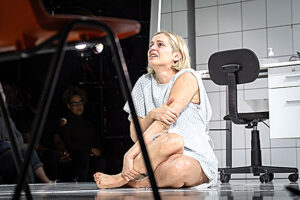
Denise has been open about her own background. She ran away to London at the age of 15, spent some time on the streets and had her own issues with addiction.
You had hard times as a teenager but was acting always there for you?
“Yeah, I think I really relate to the idea of when Emma says, ‘I want to live 100 lives’.
“I wasn’t a stage school kid or anything like that but I was pretending to be French as a six year old on the estate that I lived in.
“I wanted to create people.
“Emma says, ‘I thought, ‘ I’d train to be a therapist like Lydia’, and then I thought, ‘Maybe I just want to play the part of the therapist’.
“I remember wanting to work in an office but I just wanted to put a suit on and have a briefcase.
“I realised when I got on a stage.
“I was like, ‘Oh, this is what I’m meant to be doing’.
“But it was never about being famous or being on telly or being any of that.
“It was about being on stage. I just wanted to be on stage all the time.
“It’s quite hard financially to just be onstage so I took the opportunity to do bigger jobs after this play allowed that.
“I was really lucky.
“I got to work with Tony Gilroy on Star Wars.
“His team are just artists. They’re creating theatre as much as possible but in a filmic surrounding, so I got to have that experience.
“But mostly all I want to do is plays.
“If plays paid me what TV pays me, I would only ever do plays.”
You mentioned playing the role of Portia Coughlan, do you think there are similarities between Portia and Emma?
“Portia was in Ireland and she’s of a generation of just the judgement of women- Jesus Christ. What I felt with Portia was, ‘Yeah, you’re right to be angry’.
“I wanted to sort of vomit Portia all over everyone.
“No, I didn’t see them as similar really.
“All my women have something in common though in there’s a way of playing them that is very superficial and there’s a judgement that is usually on those kinds of women that I like to think that when I play them, I’m able to throw that judgement back in people’s faces because everyone is capable of all sorts of things.
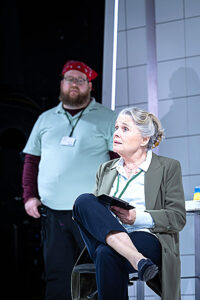
“But the women that seem to come to me live under sort of patriarchal regimes a lot of the time, and suffer as a result of that.
“I like to think I help break them out a bit because a lot of men really respond to these women in such a beautiful way.
“It kind of brings us all together instead of this sort of, ‘Oh, she’s just a crazy woman’.
“Because there are crazy men too, and crazy people everywhere.
“When I first did this play, there weren’t a lot of parts like this being played by women.
“There just weren’t so the whole thing became about my performance and people seemed to sort of miss the play a bit.
“But now women do play bigger parts.
“And we have so much more kind of available to us.
“Men, women, non-binary, queer, the whole spectrum now seems to be able to have a go which is fantastic so I feel like the conversation that I have with men now about it is much more just about what they respond to and the fact that I’m a woman doesn’t get in the way in the way that it maybe once would have.”
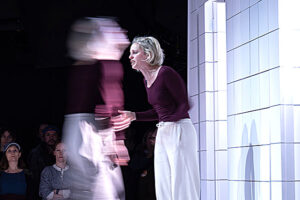
London has been good to you, is it home?
“Yeah, London is the greatest city in the world to me and it is home.
“I see myself as a Londoner.
“I know I’m an Irish woman but London is the place that took care of me.
“It really did.
“I’m really grateful for the healing that has happened around my relationship with Ireland but London is home. And I love it so, so, so much.
“(Ireland) is still a place that I retreat to, of course, but I was built by London. My success was built in London and by London, and it’s where I was told, ‘You’re actually really good at this stuff’.
“The play is the thing that made all of the career stuff easier but the rest of it was just hard work.
“I just had to work really hard and the reason I spoke about it (hard times) was I think it’s important that there are people speaking about how with hard work we are capable of great things.
“But you do need some kindness from people and you need to get on your own side.
“I’ve started getting involved with a charity called Words Matter.
“There are studies done on the effect of negative talk on children, telling children certain things about themselves or whatever and how dangerous and damaging it can be.
“I really resonate with that: Growing up in the church and having teachers being allowed to say whatever they want and the cruelty of it.
“Cruelty is the kind of worst sort of abuse.
“I think I had to do a lot of undoing of the verbal stuff that I had learned about myself.”
People, Places and Things is at Traflagar Theatre until 10 August.
For tickets and more information, click here.



